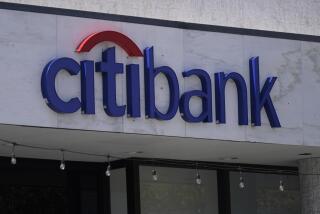Judge Approves Class-Action Suit Against Great American
- Share via
A federal judge granted class-action status Monday to a lawsuit filed by shareholders of ailing Great American Bank against former executives they claim ignored dire warnings about their 1986 plunge into Arizona’s real estate boom.
U.S. District Judge Leland C. Nielsen refused to dismiss the two suits filed in tandem on behalf of three shareholders who claim the Great American executives ignored written warnings in 1986 about the purchase of an Arizona thrift and its allegedly shaky loan portfolio.
“They elected to go ahead and, having done so, they should not be surprised that their shareholders call them into account for their actions,” Bill Lerach, lead attorney for the plaintiffs, told Nielsen.
Settlement conferences were under way on the suits, which will likely not be ready for trial for more than a year.
“There are conversations going on,” said Robert Steiner, attorney for former Great American chairman Gordon Luce. “One always hopes.”
The suits seek damages from Luce and a number of former officers and directors, alleging that they violated their fiduciary duties and committed securities fraud from March 1986 to last February by artificially inflating the price of Great American’s stock.
The plaintiffs’ lawyers have said that Great American officials misrepresented the 1986 purchase of the ailing thrift Home Federal of Tucson, which placed Great American in the Arizona real estate market just before the state’s land boom began to fizzle.
An in-house due diligence report submitted in 1985 warned that Home Federal, which is not to be confused with the HomeFed Bank based in San Diego, was on shaky ground, had insufficient loan loss reserves and had apparently overestimated its profit projections by 39%.
Great American, which lost a staggering $263.4 million in 1989, was forced to sell its California branch system to Wells Fargo last month for $491 million.
Steiner argued that the suits did not prove reckless negligence on the part of Great American and that the slump in Arizona real estate was an unforeseeable event.
“I raise a strong objection to the contention that somehow there has been criminal conduct,” Steiner said.
“We are not dealing with a Keating or a Lincoln or a Vernon,” he said, attempting to distance the still-functioning Great American from notorious thrift disasters in other parts of the nation.
He argued that the Home Federal purchase, which gave Great American a branch system in Arizona at a time when the state was a lucrative market for out-of-town lenders, was a valid business decision.
Although the amount of damages sought has been estimated at about $150 million, Lerach said the actual amount for which the defendants would be liable is hard to predict because of the effect market forces had on the value of Great American’s stock.
“They can point to every other savings and loan in the United States that has suffered serious stock price declines,” Lerach said.
More to Read
Inside the business of entertainment
The Wide Shot brings you news, analysis and insights on everything from streaming wars to production — and what it all means for the future.
You may occasionally receive promotional content from the Los Angeles Times.










